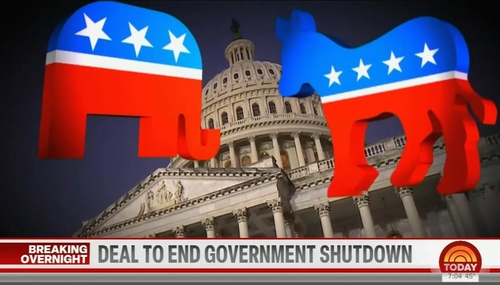Conservative Republicans are divorced from reality while Democrats are governed by the facts.
That's the take Time's Alex Altman has on how the two congressional parties are addressing the looming debt ceiling deadline in his July 19 Swampland blog post, "The Fact Gap: Can Republicans Overcome Their Alternate Reality to Strike A Debt Deal?":
There are plenty of reasons Congress is playing a high-speed game of chicken with the debt-limit negotiations, but one of the main ones is that the two parties can’t agree on what would happen if they crash. On one side, the Obama Administration, Capitol Hill Democrats, Wall Street whizzes and budget experts have been wearing out their thesauruses looking up new words for “catastrophe” as they try to explain to the public that failing to raise the $14.3 trillion federal debt limit by Aug. 2 would result in a radically different country on Aug. 3. On the other, a passel of House Republicans are essentially dismissing these claims as hysterical fear-mongering.
[...]
At first blush, House Republicans’ dismissal of overwhelming evidence from a bipartisan crop of experts seems staggering. But this is a party whose governing philosophy is predicated on the idea that government is perversely swollen, and that cutting off the circulation to some of its limbs can alleviate pressure without causing irreparable harm. Some Democrats believe that the Republican Party’s antipathy toward government, and their members’ perceived mandate to drastically shrink the budget, has clouded their ability to appraise the severity of the situation. And Democrats are clearly baffled by the challenge of persuading opponents who not only have a different set of priorities, but a different set of facts. “There’s a question about how much the facts matter to them,” says a Democratic official. “And I don’t know what to do about that.”
Of course, hitting a debt ceiling deadline is unprecedented, so it's uncertain what exactly will happen should August 2 come and go and the ceiling is not raised. As such it's not a "fact" that catastrophe would befall the U.S. economy, even if it's widely predicted or widely believed to happen.
What's more, Altman's focus on the August 2 deadline neglects a longer-term concern that credit ratings agencies have about the willingness or ability of Congress and the president to take tough measures to tackle the U.S. national debt.
As the Standard & Poor's agency noted last week (emphasis mine):
If a debt ceiling agreement does not include a plan that seems likely to us to credibly stabilize the U.S.' medium-term debt dynamics but the result of the debt ceiling negotiations leads us to believe that such a plan could be negotiated within a few months, all other things unchanged, we expect to affirm both the long- and short-term ratings and assign a negative outlook, pending review of the eventual plan. If such an agreement is reached, but we do not believe that it likely will stabilize the U.S.' debt dynamics, we, again all other things unchanged, would expect to lower the long-term 'AAA' rating, affirm the 'A-1+' short-term rating, and assign a negative outlook on the long-term rating.
Similarly on July 13, Moody's warned (emphasis mine):
If the debt limit is raised again and a default avoided, the Aaa rating would likely be confirmed. However, the outlook assigned at that time to the government bond rating would very likely be changed to negative at the conclusion of the review unless substantial and credible agreement is achieved on a budget that includes long-term deficit reduction. To retain a stable outlook, such an agreement should include a deficit trajectory that leads to stabilization and then decline in the ratios of federal government debt to GDP and debt to revenue beginning within the next few years.
Moody's does not take a position on what measures should be included in any deficit reduction package. Instead, it is the resultant deficit and debt trajectories that are relevant to the rating and its outlook.
In other words, whatever happens on August 2, the U.S. government MUST reduce its debt in the mid-to-long term or face the possibility of a downgrade in credit rating, which is certain to have negative economic consequences for the U.S. economy.




